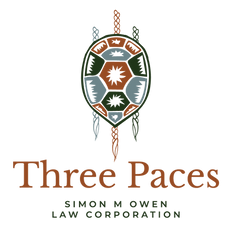
** May 2024 UPDATE: The Narwhal just published an in-depth article on this topic. You can read it here.
A recent sunny evening found me crouched on the (wonderfully clean) upper floor at KWENCH coworking space near downtown Victoria, listening to four strong voices taking turns dropping the mic on my colonized mind.
Maybe you know what such a mind feels like. For my own WhiteMaleLawyer© variant, it’s like cement filling all cracks against the possibility of change, of differences that matter. That, too bad, but there’s no real alternative to the quo that sustains my status on the land. It’s a tight feeling, somehow both smug and anxious. Smug since state-sponsored repression and ignorance have worked out for me quite nicely. Anxious since I know in my oldest bones that my standing here – and really, my deepest well-being – demand more than just following the laws that one hand has written.
I’d come to hear more about Reciprocity Trusts, which is putting into practice a simple idea that attunes to a sense common to both Western and Indigenous traditions. This is, basically, the notion that living here bears both value and responsibility, and that grants of such value must be signified. We signify value when we buy or rent our homes, or pay our taxes. But, while we’ve gotten used to windily acknowledging the territories we live upon, our actual use and ownership of them – so vigorously maintained by our laws and markets – bears us no obligation, bears our hosts no benefit. It is, in the strictest terms, unaccountable.
As Reciprocity Trusts recognizes, money must be audible in this conversation. This is particularly so where so few of us are actually conversing with each other – among the facts of our divided and Covided region is that we hardly know our neighbours, let alone any of the lək̓ʷəŋən or WSANEC folks whose families were moved and re-moved to make room for ours. Hence the financial part of their proposal: that we pledge 1% of monthly property taxes or rent or profits towards a trust held by and for the ten Nations whose lands and relations are based on southern Vancouver Island (you can read much more on their website).
But reciprocity is more than a transactional calculus (don’t we have enough of those)? Hence this gathering, and these voices, to whom the moderator lobbed massive questions (does Victoria feel like a centre of colonialism? What gives them hope?). The responses were just as expansive – generous, courageous, grounded in challenging facts but always tuned to tangible actions of resistance and hope.
Yuxwelupton Qwal’ qaxala (Bradley Dick), a lək̓ʷəŋən, Mamalilikulla and Ditidaht cultural steward, artist and educator, honestly noted how colonialism “has turned me into an inevitable hypocrite”. Meaning the markets he must negotiate to find home – find where and how to live – dictate decisions that run counter to his values, his Indigenous laws. The “good life” of private property ownership, an idea that has all but consumed the South Island, burdens and obscures the territories where he seeks to be a good host and guest.
Sometimes I’m embarrassed by my privileges - ashamed, paralyzed. Sometimes I want to deny their existence or disavow their weight. But as Bradley reminded us, when we recognize them as a part of who we are, they can be a part of what we must (un)do.
“How do we be human?” asked Kwakwaka’wakw Hereditary Chief and Awi’nakola Foundation founder Rande Cook. In relationship. In community. In curious, care-centred celebration of the diverse ways we’ve come here and become who we are. No one is excluded. No one is expected to follow any exact path of belonging. Dr. Lisa Gunderson, founder of One Love Consulting, called for each of us to find the ones who allow us to look proudly in the mirror. For her as a displanted Black feminist now living on Coast Salish lands, these are the disrupters, the dismantlers, the abolitionists of all of the oppressive structures who seek to buy and define and silence the voices that are still hers to learn and sing.
We’re all family, Chief Cooke said. Our wealth is here. And there was Craig Candler, the founder of Reciprocity Trusts, telling us that this idea was planted in a generation-ago conversation with the late Esquimalt Chief Andy Thomas, as they wondered together how to signify relationships between hosts and guests on his people’s homeland. “Maybe one day if you get enough people to sign on to something like this”, Craig remembers Chief Andy saying, “maybe that day it will happen”.
Maybe this is that day.

Comments